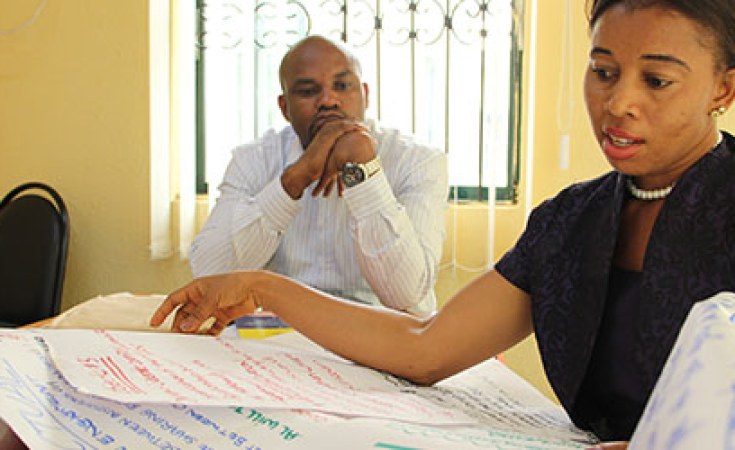Many nonprofits that seek additional funding navigate a complicated balancing act when providing fee-for-services. Julia Roig, president of PartnersGlobal, which supports local civic leaders in more than 50 countries, and Kehinde Togun, deputy director of the group's Sub-Saharan Africa programs, recently scaled up support for nonprofits making this shift in West Africa.
Abiodun Baiyewu-Teru, executive director of a human rights group in Nigeria who studied law at Georgetown University, advocates on a range of worthy causes alongside 78 team members. But from Abuja, she and her organization, Global Rights, face a classic dilemma that nonprofits across the globe face: While the nonprofit seeks sufficient resources to sustain and expand its work, the landscape of traditional donors is contracting and often doesn't cover basic operating costs
In a dilemma like this, blurring lines between profit-seeking ventures and traditional non-profits are producing opportunities to solve complex development challenges that Global Rights addresses– like corruption, poverty and inequality. Under the mission of achieving social good, those of us working in the nonprofit sector have adapted how we do business and developed new private sector partnerships.
Recently, PartnersGlobal has joined forces with the Ford Foundation and the GE Foundation to expand in this area of work in West Africa, promoting new business models with local nonprofit organizations. We have been working with our affiliates in the region, Partners West Africa – Senegal and Partners West Africa – Nigeria, to incorporate social entrepreneurship concepts for peer organizations in Nigeria and Senegal. Earlier this year, we convened 45 diverse organizations, including Global Rights, together with business leaders to share experiences in how to become more entrepreneurial.
In practice, many groups struggle with this shift in mindset, finding it difficult to take advantage of new revenue-generating opportunities and corporate partnerships.
Here are seven considerations that can help nonprofits make the transition:
- The legal environment matters. Nonprofits need to understand what the local legal framework allows regarding activities that generate profit. Depending on an organization's registration or statutes, there may be legal or tax consequences to conducting new business.
- New definition of "market." Nonprofit leaders are often not trained to think about their work in terms of a market that has competitors and potential clients. Analyzing the market prior to beginning any revenue-generating activity is essential.
- An organization-wide approach. There is a misperception amongst many nonprofits that entrepreneurship is a matter of better marketing. Rather, leaders of civic organizations must start with an assessment of their strengths and weaknesses to address shortfalls, especially financial management capabilities.
- Intensive staff time and resources. It is often difficult for busy grassroots leaders to dedicate time to adapt a new business model. The entire staff and board cannot underestimate the time investment. They should also plan adequately as it will sometimes necessitate shifts in staff responsibilities.
- Adapting nonprofit "speak." Business and nonprofit representatives often travel in different circles and generally speak different professional "languages." This can be a barrier to nonprofits being seen as credible service providers for businesses as potential clients. In particular, nonprofits need to be clear about the results they achieve.
- Defining your niche and services. Private sector representatives in our initiative recommended that local nonprofits be clear about their niche and demonstrate their potential impact through business language, like return-on-investment.
- Determining the right pricing. Because nonprofits operate on grants and donor support, they have little experience with pricing their activities to make a profit. These leaders should seek out professional advice for pricing their products and services to be realistic about the potential for profit.
Examples of revenue-generating activities among groups in our initiative include providing training programs and charging for their publications. Global Rights, for example, has experimented with renting out their training rooms for extra income. That service has expanded into partnerships with their clients to jointly conduct international trainings. Recently, these partnerships have led to consultancies with the British Council and private universities.
One of the main takeaways from our initiative is there is a clear need for local companies and nonprofits to interact more in West Africa for this shift in entrepreneurial mindset to take place. Nonprofits that succeed in becoming more enterprising will be more likely to flourish in the region and will gain a level of independence needed for a viable social sector.
Julia Roig, President of PartnersGlobal, works with an international network of 19 Partners' affiliate organizations to build effective multi-sector partnerships for sustainable development.
Kehinde Togun is the Deputy Director of Partners' Sub-Saharan Africa team and manages the region's portfolio of governance and security programs.
All views expressed are those of the authors.
This article first appeared at GE Reports.


